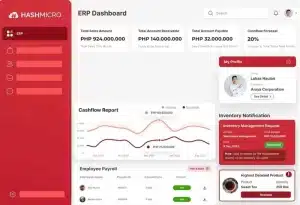Imagine managing your business operations with a tool that simplifies processes, enhances efficiency, and drives growth. SAP (System Application and Product in Data Processing) has evolved from a financial management system into a comprehensive platform for optimizing modern businesses.
Without a reliable management system, businesses often face challenges like disorganized workflows, inaccurate data, and inefficient operations. These issues can lead to poor decision-making, missed opportunities, and financial losses, hindering long-term growth.
A study in the Philippines revealed that companies adopting integrated systems, like ERP, experienced a 30% improvement in operational efficiency. This underscores the importance of systems like SAP in enabling businesses to adapt and thrive in a competitive environment.
This article explores SAP, its key features, and the solutions it offers to overcome these challenges. Discover how HashMicro ERP software can transform your business and unlock its full potential.
Table of Contents

Key Takeaways
|
What is SAP?
SAP is a powerful Enterprise Resource Planning (ERP) software that integrates various business functions, such as finance, production, and human resources, into a centralized system. By leveraging a single database, ERP ensures seamless data flow between modules, minimizing redundant data entry and improving operational accuracy.
The core of SAP’s ERP offerings is the SAP ERP Central Component (SAP ECC), a robust on-premises system widely adopted by medium and large companies. ECC’s functional modules, such as Human Capital Management (HCM), Production Planning (PP), and Sales and Distribution (SD), provide comprehensive tools to support diverse business processes efficiently.
Today, ERP encompasses a range of solutions, including ECC, S/4HANA, Business One, Business ByDesign, and SAP T-Codes for accessing specific functions within the SAP environment. These systems cater to back-office needs like financial reporting, inventory, and production management while also supporting front-office operations like Customer Relationship Management (CRM) and Supplier Relationship Management (SRM).
The Benefits of SAP ERP Software

SAP ERP software offers transformative solutions for businesses, enabling smoother operations with its integrated system. By understanding SAP and its practical applications, businesses can optimize processes, improve efficiency, and safeguard data, ensuring sustainable growth in an increasingly competitive market.
1. Effective administrative systems
SAP solutions streamline administrative tasks by providing a centralized data storage and management platform. This reduces manual processes and enables efficient planning, reporting, and financial management.
With the ERP application, companies can input, manage, and implement data seamlessly, eliminating lengthy communication processes and enhancing productivity.
2. Enhanced operational efficiency
By integrating business functions, SAP software improves operational efficiency across all departments. Managers can monitor each division’s progress in real-time without direct observation, ensuring smooth workflows.
This feature exemplifies the meaning of the ERP system, where automation and integration enable businesses to run faster and more effectively.
3. Improved data privacy and security
The SAP meaning in business emphasizes protecting sensitive company data with robust encryption and secure access protocols. Only authorized users can access the system, safeguarding company information from potential breaches.
Additionally, built-in security systems and firewalls ensure data accuracy and allow administrators to create backups easily.
4. Customizable to unique business needs
One of the most significant advantages of SAP software is its ability to adapt to diverse industry requirements. Each business has unique needs, and ERP enables customization to ensure operational efficiency and relevance.
This flexibility underscores the value of ERP solutions in delivering tailored applications that meet specific organizational demands.
5. Consistent and reliable business operations
SAP ERP minimizes human errors by automating data input, ensuring accurate and consistent business processes. This consistency enhances a company’s reputation and reliability in the eyes of consumers and stakeholders. The ERP system fosters long-term business success by maintaining operational integrity and quality.
ERP software also supports better decision-making by providing transparent, real-time data management. Businesses can reduce administrative costs, track performance metrics, and set actionable goals using insights derived from the system. With its ability to automate processes and improve transparency, ERP remains a cornerstone for efficient and secure business operations.
Adopting SAP software examples like these ensures businesses stay competitive and efficient in today’s fast-paced environment. Whether improving operational workflows, safeguarding data, or customizing applications, ERP is an invaluable asset for businesses looking to thrive.
How Does SAP ERP Work?

SAP ERP is an integrated system designed to manage diverse business processes through a centralized platform. It uses a Graphic User Interface (GUI) to allow IT experts or SAP resellers to configure and operate the system according to the company’s needs, ensuring efficient workflow management.
Businesses often rely on paid consultants for training and system installation to implement the SAP application effectively. This learning process is essential for employees to grasp the ERP system’s meaning, making maximizing the software’s potential for seamless business operations easier.
Unlike traditional systems, modern ERP solutions like those provided by HashMicro simplify installation and training through cloud-based ERP systems. With 24/7 customer support and expert assistance included, businesses can quickly adapt to the ERP software while maintaining uninterrupted operations.
What Industries Use SAP Systems?

SAP systems have become a trusted solution across various industries in Indonesia, enhancing operational efficiency and streamlining complex processes. Below are the key sectors leveraging ERP software and how this technology helps transform their operations.
1. Retail: In retail, ERP facilitates inventory management, sales processing, and customer data analysis. Using the ERP application, retail businesses optimize sales processes, track stock levels in real-time, and enhance customer experiences through data-driven insights.
2. Construction: Construction companies rely on SAP for project management, cost control, and resource planning. The ERP accounting module helps monitor budgets, track expenses, and ensure projects stay on financial targets, improving overall efficiency and accountability.
3. Manufacturing: The manufacturing sector benefits from ERP software examples that manage production, logistics, and supply chains. SAP’s production module supports better production planning, quality control, and supply chain management, ensuring streamlined operations and reduced downtime.
4. Food & Beverage (F&B): In the F&B industry, SAP software is instrumental in managing raw material procurement, inventory, and product distribution. By leveraging sales and inventory management modules, companies improve supply chain efficiency, stock control, and sales operations, ensuring timely product availability.
5. Government: Government agencies use ERP systems for administrative tasks, accounting, and financial reporting. A detailed SAP accounting review would highlight how these systems efficiently manage public budgets, financial planning, and transparent reporting.
6. Education: ERP assists in academic administration, financial management, and human resource operations in education. Modules for student data management and staff administration ensure smooth operations and efficient allocation of resources.
7. Mining: Mining companies adopt SAP applications to oversee mining operations, cost control, and logistics. The system’s modules improve operational planning, asset management, and financial reporting, making processes more efficient and reliable.
8. Financial Services: Financial institutions use ERP software examples for accounting, risk management, and financial reporting. By integrating SAP meaning into business, they streamline transactions, enhance financial analysis, and ensure compliance with industry regulations.
9. Healthcare: Hospitals utilize ERP to manage operations, medical inventory, and patient administration. The ERP system ensures efficient data management, tracks medical supplies, and simplifies administrative workflows for better patient care.
10. Start-Ups: Start-ups benefit from SAP solutions tailored to manage growth and operations efficiently. Customizable modules support financial management, sales tracking, and project management, enabling start-ups to scale effectively while maintaining operational control.
By adapting to the unique needs of each industry, SAP ERP remains a vital tool for enhancing productivity, ensuring compliance, and driving growth across sectors. These ERP software examples highlight how businesses can leverage technology to stay competitive and efficient.
When Do Companies Need to Implement SAP Applications for their Business Operations?

Implementing ERP software allows businesses to optimize and integrate all operational aspects seamlessly. By monitoring assets and workflows across all divisions, SAP gives businesses the visibility needed to enhance coordination and productivity.
This comprehensive monitoring capability significantly improves operational efficiency, boosting productivity and profitability. Additionally, ERP solutions offer modules like analytics and risk management, enabling companies to tailor the system to their unique needs and goals.
By providing accurate insights, SAP ERP software empowers businesses to make informed decisions that drive growth and operational excellence. The ERP system’s meaning is clear for companies aiming to enhance efficiency and strengthen their business capabilities: it is an essential tool for sustainable success.
While SAP Business One is a well-known option, exploring alternatives like HashMicro can provide additional flexibility and value. With customizable ERP solutions, HashMicro supports seamless integration and tailored features to meet diverse business needs effectively. Click the banner below to learn more!

Types of SAP Applications from HashMicro for Your Business
Understanding what SAP is and how it benefits businesses is essential, but exploring SAP alternatives that align with your needs can also provide valuable options. HashMicro offers comprehensive examples of SAP ERP software designed to enhance operational efficiency across various industries.
Below are the key ERP solutions you can leverage for your business:
1. SAP ERP Sales
HashMicro’s ERP Sales module helps businesses manage their sales processes with integrated tools. It includes customer management features to track client details, purchase history, preferences, and feedback.
Sales management tools allow companies to handle orders, shipping, pricing, and discounts, optimizing revenue streams. By integrating with other essential modules, this system enhances customer relationships and increases overall profitability.
2. SAP ERP Inventory
With HashMicro’s ERP Inventory, businesses can efficiently manage stock levels and avoid overstocking or shortages. Real-time inventory monitoring ensures companies can set minimum and maximum stock levels for seamless operations.
Features like barcode management and serial tracking improve stock visibility and reduce the risk of losses. This module simplifies inventory control, enabling businesses to maximize productivity while minimizing operational waste.
3. SAP ERP Accounting
The ERP Accounting module automates financial management, providing fast and accurate accounting processes. It includes features for account management, financial reporting, and payment processing, ensuring smooth financial operations.
Businesses can generate automatic financial statements, including balance sheets and cash flow reports, to improve decision-making. This module also enhances efficiency by streamlining payments to suppliers and customers while offering comprehensive financial insights.
4. SAP ERP Procurement
HashMicro’s ERP Procurement streamlines businesses’ purchasing and procurement processes. With tools for purchase management, price quotation comparison, and shipment tracking, companies can reduce inefficiencies.
Purchase management features enable businesses to create requests, manage approvals, and effectively control budgets. This module ensures smooth procurement workflows by tracking real-time shipments, reducing risks, and improving cost efficiency.
By utilizing these ERP software examples, businesses can achieve greater efficiency, accuracy, and productivity. HashMicro’s SAP ERP solutions provide a robust foundation for companies looking to optimize their operations and scale seamlessly.
Advantages of HashMicro’s ERP Software

HashMicro is a leading ERP software vendor in Southeast Asia, offering a comprehensive system for both back-office and front-office operations. With integrated solutions and customizable features, HashMicro provides businesses with the tools to improve efficiency and customer satisfaction.
Below are the key advantages of using HashMicro’s ERP software:
1. Fully customizable to your needs
HashMicro’s ERP solutions allow businesses to customize the main dashboard to suit their unique operational requirements. Companies can select specific modules and features necessary for their industry, ensuring relevance and efficiency.
This flexibility is particularly beneficial for businesses with specialized needs that require tailored tools. By adapting the system to your business, HashMicro ensures seamless operations without unnecessary complexity.
2. User-friendly interface
One standout feature of HashMicro’s ERP is its user-friendly interface, which is designed for ease of use. The dashboard includes simple, intuitive icons that make navigation effortless for users at all levels.
With a sleek, modern design, the system reduces the learning curve and allows employees to utilize its powerful features quickly. This enhances productivity while minimizing time spent on training.
3. Unlimited users without additional costs
Unlike many SAP software examples that charge per user, HashMicro offers a fixed price with no user limits. Businesses can add as many employees as needed without incurring extra costs, making it ideal for growing companies.
This feature helps businesses scale efficiently while maintaining budget-friendly operations, a significant advantage for organizations of any size.
4. Full integration for real-time data access
HashMicro’s ERP application ensures full module integration, enabling real-time coordination and data sharing. This allows businesses to access accurate information instantly, reducing the likelihood of human error.
By connecting departments seamlessly, the system enhances collaboration and streamlines operations for greater efficiency and reliability.
With these advantages, HashMicro’s SAP ERP solutions provide businesses with a comprehensive, scalable, and user-friendly system. Whether improving operational workflows, financial management, or customer satisfaction, HashMicro’s SAP software is a reliable partner for business growth.
Conclusion
By now, you’ve understood what SAP is, its benefits, and the various types of SAP software available. The next crucial step is to choose the best solution that aligns with your company’s unique requirements and operational goals.
The ideal software addresses your business challenges while offering customizable features tailored to your needs. HashMicro provides an all-in-one solution that simplifies operational management with its flexible modules and robust security, making it the trusted choice for leading companies.
With HashMicro, you benefit from competitive pricing, unlimited user access, and unmatched customization options. Take the next step in transforming your business—request a pricing plan and schedule a free demo today to experience how HashMicro can optimize your operations.




































